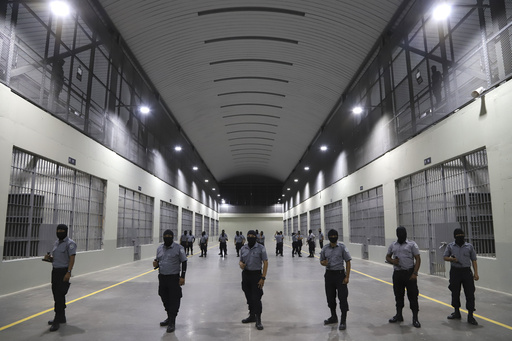GUATEMALA CITY — President Donald Trump announced on Tuesday that he is considering a proposal from El Salvador to take in violent American offenders for incarceration in what has been described as “the most severe cases.” Despite expressing interest in the initiative, both Trump and Secretary of State Marco Rubio acknowledged the potential legal hurdles involved.
Rubio had just finalized a notable agreement with El Salvador’s President Nayib Bukele, which would see the Central American nation accept American citizens and other U.S. deportees—regardless of nationality—who have been convicted of violent crimes. “If we had a legal right to do it, I would do it in a heartbeat,” Trump commented to reporters in the Oval Office, adding that his administration is currently investigating the legal implications.
Earlier in the day, while attending a press conference in San Jose alongside Costa Rican President Rodrigo Chaves, Rubio highlighted the complex legal framework impacted by such a decision. He described the arrangement as “a very generous offer” that would allow the United States to outsource the management of some of its most dangerous offenders at a reduced cost.
During his visit across several Central American countries this week, Rubio also faced challenges related to significant changes within the U.S. Agency for International Development (USAID). His recent discussions on immigration prioritized the Trump administration’s commitment, despite the turmoil within USAID causing anxiety among staff regarding job security.
On Monday, USAID employees and Democratic representatives were unable to access the agency’s headquarters in Washington after Elon Musk, tasked with budget cuts, announced an agreement to diminish the agency’s role. Following Trump’s inauguration, a sweeping freeze on foreign assistance resulted in numerous layoffs and halted global programs. Although Rubio later indicated a waiver for essential services, fears of losing U.S. aid indefinitely linger, hampering aid and developmental initiatives.
“I believe if an organization is receiving funds from the United States and does not understand how to apply a waiver, then we have serious concerns regarding that organization’s competence,” he stated. Furthermore, he reaffirmed his long-standing support for foreign aid, arguing that every dollar spent must align with U.S. national interests.
Rubio and Chaves addressed the pressing immigration and security issues plaguing Costa Rica, which has seen an influx of migrants and has become a destination for many fleeing from Nicaragua due to political crackdowns since 2018. Costa Rica is also grappling with a surge in drug-related violence. Chaves acknowledged the need for enhanced cooperation in the fight against international organized crime and welcomed Rubio’s offers for continued U.S. support.
After his discussions in Costa Rica, Rubio proceeded to Guatemala City to meet with President Bernardo Arévalo, having previously met with Bukele in El Salvador. Bukele confirmed the controversial deportation proposal via social media, asserting that El Salvador would only accept “convicted criminals” and would levy a fee that, while low for the U.S., would be significant for El Salvador to maintain its prison system.
The State Department has characterized El Salvador’s overcrowded correctional facilities as “harsh and dangerous,” noting severe deficiencies in sanitation, water supply, and other crucial amenities.
El Salvador has been under a state of emergency since March 2022 after a violent surge attributed to powerful street gangs. In response, Bukele suspended essential civil liberties and oversaw the apprehension of over 83,000 individuals, often without due process. In 2023, he inaugurated a new prison specifically for gang members, which accommodates up to 40,000 people but lacks programs aimed at rehabilitation or reintegration post-incarceration.
In recent years, El Salvador has experienced a notable decline in homicide rates, with 114 recorded last year, a significant departure from its previous reputation as one of the most dangerous nations globally, contributing to Bukele’s rising popularity among the populace of approximately 6 million.
Throughout his journey across Central America, Rubio conveyed that migration continues to be the focal point of his discussions while also contending with various significant administrative alterations under the Trump administration. In a letter to lawmakers, Rubio shared that he is now serving as the acting administrator of USAID but has delegated daily operational responsibilities. He noted that USAID’s organizational processes have been hampered by the freeze on foreign assistance, which complicates the execution of foreign relations initiatives.
He articulated plans for USAID to potentially reorganize and integrate its missions and offices under the State Department, with a possibility of abolishing parts of the agency according to legal guidelines.




